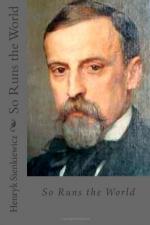Such are the present times! Among those searching in darkness, wandering and weary ones, one remained quiet, sure of himself and his doctrine, immovable and almost serious in his pessimism. It was Emile Zola. A great talent, slow but powerful and a potent force, surprising objectivism if the question is about a sentiment, because it is equal to almost complete indifference, such an exceptional gift of seeing the entire soul of humanity and things that it approaches this naturalistic writer to mystics—all that gives him a very great and unusual originality.
The physical figure does not always reproduce the spiritual individuality. In Zola, this relation comes out very strikingly. A square face, low forehead covered with wrinkles, rough features, high shoulders and short neck, give to his person a rough appearance. Looking at his face and those wrinkles around the eyes, you can guess that he is a man who can stand much, that he is persevering and stubborn, not only in his projects but in the realization of them; but what is mere important, he is so in his thinking also. There is no keenness in him. At the first glance of the eye one can see that he is a doctrinarian shut up in himself, who does not embrace large horizons—sees everything at a certain angle, narrow-mindedly yet seeing distinctly.
His mind, like a dark lantern, throws a narrow light in only one direction, and he goes in that direction with immovable surety. In that way the history of a series of his books called “Les Rougon-Macquart” becomes clear.
Zola was determined to write the history of a certain family at the time of the Empire, on the ground of conditions produced by it, in consideration of the law of heredity.
There was a question even about something more than this consideration, because this heredity had to become the physiological foundation of the work. There is a certain contradiction in the premises. Speaking historically Rougon-Macquart had to be a picture of French society during its last times. According to their moral manifestations of life, therefore, they ought to be of themselves more or less a normal family. But in such a case what shall one do with heredity? To be sure, moral families are such on the strength of the law of heredity—but it is impossible to show it in such conditions—one can do it only in exceptional cases of the normal type. Therefore the Rougon are in fact a sick family. They are children of nervousness. It was contracted by the first mother of the family, and since that time the coming generations, one after another, followed with the same stigma on their foreheads. This is the way the author wishes to have it, and one must agree with him. In what way, however, can a history of one family exceptionally attainted with a mental disorder be at the same time a picture of French society, the author does not explain to us. Had he said that during the Empire all society was sick, it would be a trick. A society can walk




